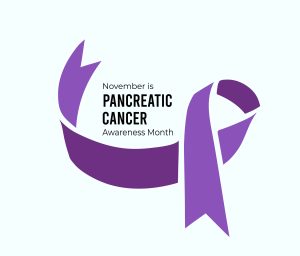 November is Pancreatic Cancer Awareness Month. During this time, Flushing Hospital Medical Center is raising awareness of pancreatic cancer by sharing important facts about the disease.
November is Pancreatic Cancer Awareness Month. During this time, Flushing Hospital Medical Center is raising awareness of pancreatic cancer by sharing important facts about the disease.
The pancreas is an organ located in the abdomen. It plays an essential role in digestion by producing enzymes that break down food. The pancreas also produces hormones such as insulin that help the body regulate blood sugar.
Several types of cancerous growths can occur in the pancreas, this includes pancreatic adenocarcinoma, the most common type of pancreatic cancer. Squamous cell carcinomas, adenosquamous carcinomas, and signet ring cell carcinomas are some of the less common types of pancreatic cancer.
Pancreatic adenocarcinoma develops when the exocrine cells in the pancreas begin to grow out of control and form a tumor. There is no clear answer as to what causes adenocarcinoma; however, some people have a greater risk than others of developing the disease. This includes those who:
- Smoke or use tobacco products
- Are exposed to chemicals used in metal working or dry-cleaning industries
- Are obese
- Are born male
- Are over the age of 60
- Are of African American descent
- Are of Ashkenazi Jewish descent
- Have inherited certain gene mutations
- Have diabetes
- Have chronic pancreatitis
According to the American Cancer Society, pancreatic cancer is hard to find early. This is because symptoms typically do not present until after cancer has progressed (spreading outside the pancreas to other organs). Symptoms can include:
- Jaundice
- Loss of appetite
- Unexplained weight loss
- Fatigue
- Stomach bloating
- Burning sensation in the stomach
- Nausea and vomiting
- Floating stools
- Dark urine
- Fever
- Chills and sweats
A person with signs and symptoms of pancreatic cancer should consult their physician. A series of tests can be ordered to diagnose the disease. If cancer is detected, a doctor will try to determine the stage based on the size of the tumor, the spread to nearby lymph nodes, or the spread to distant lymph nodes and organs. Pancreatic cancer stages range from zero to four.
Treatment for pancreatic cancer depends on various factors such as the location and stage of cancer as well as the status of your overall health. Your doctor may recommend radiation therapy, or surgery, or a combination of both.
All content of this newsletter is intended for general information purposes only and is not intended or implied to be a substitute for professional medical advice, diagnosis or treatment. Please consult a medical professional before adopting any of the suggestions on this page. You must never disregard professional medical advice or delay seeking medical treatment based upon any content of this newsletter. PROMPTLY CONSULT YOUR PHYSICIAN OR CALL 911 IF YOU BELIEVE YOU HAVE A MEDICAL EMERGENCY.
